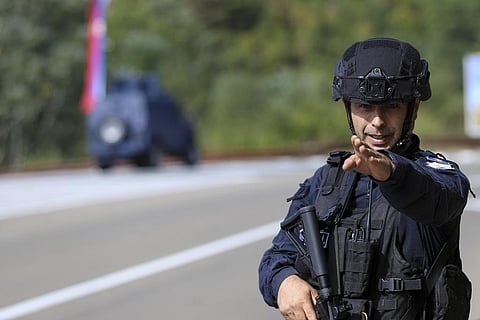

PRISTINA: One policeman was killed and another wounded in north Kosovo early Sunday, according to authorities, during an armed attack on a patrol as it approached a blocked road near the border with Serbia.
"As soon as they arrived in the vicinity of the place where the blockade was reported, the police units were attacked from several different positions with an arsenal of firearms, including hand grenades and shoulder-fired missiles," police said in a statement.
Kosovo's Prime Minister Albin Kurti was quick to condemn the attack, calling the ambush near the village of Banjska an act of terrorism.
"The attackers are professionals with masks and armed with heavy weapons. We condemn this criminal and terrorist attack," Kurti wrote on social media.
"Organised crime with political, financial and logistical support from officials in Belgrade is attacking our country," he added.
Serbian state media outlet RTS later reported that Jarinje and Brnjak border crossings between Serbia and Kosovo have been closed.
Automatic gunfire
An AFP reporter near Banjska said automatic gunfire could be heard hours after the incident, while authorities had sealed off the area.
The incident comes more than a week after talks between the leaders of Serbia and Kosovo centred on improving ties failed to make a breakthrough during EU-mediated negotiations in Brussels.
The EU has been trying for years to resolve the long-running dispute between Balkan neighbours that has soured relations since their war more than two decades ago.
Brussels believed it had broken the logjam by hammering out a plan to normalise ties in March, but since then there has been minimal progress.
The diplomatic stalemate comes as tensions in the troubled north have been smouldering for months, following the Pristina government's decision to install ethnic Albanian mayors in four Serb-majority municipalities in May.
The move has triggered one of the worst bouts of unrest in the north in years. Demonstrations followed, as well as the arrest of three Kosovar police officers by Serbia and a violent riot by Serb protesters saw more than 30 NATO peacekeepers injured.
Kosovo remains overwhelmingly populated by ethnic Albanians, but in the northern stretches of the territory near the border with Serbia, ethnic Serbs remain the majority in several municipalities.
The tussle in the north is just the latest in a long list of incidents to rock the area since Kosovo declared independence from Serbia in 2008. That was nearly a decade after NATO forces helped push Serbian troops from the former province during a bloody war that killed around 13,000 people.
Belgrade -- along with its key allies China and Russia -- has refused to recognise Kosovo's independence, effectively preventing it from having a seat at the United Nations.
During an address to the United Nations General Assembly last week, Serbian President Aleksandar Vucic accused the West of hypocrisy. He said its recognition of Kosovo's independence was based on the same justification as Russia's war on Ukraine.